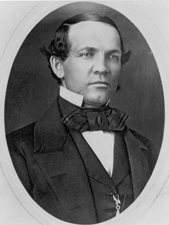Charles E. Stuart
| Charles Edward Stuart | |
|---|---|
 |
|
| President pro tempore of the U.S. Senate | |
|
In office June 9, 1856 – June 10, 1856 |
|
| Preceded by | Jesse D. Bright |
| Succeeded by | Jesse D. Bright |
|
United States Senator from Michigan |
|
|
In office March 4, 1853 – March 4, 1859 |
|
| Preceded by | Alpheus Felch |
| Succeeded by | Kinsley S. Bingham |
| Member of the U.S. House of Representatives from Michigan's 2nd district |
|
|
In office March 4, 1851 – March 3, 1853 |
|
| Preceded by | William Sprague |
| Succeeded by | David A. Noble |
|
In office December 6, 1847 – March 3, 1849 |
|
| Preceded by | Edward Bradley |
| Succeeded by | William Sprague |
| Member of the Michigan Senate | |
|
In office 1842 |
|
| Personal details | |
| Born |
November 25, 1810 Waterloo, New York, US |
| Died | May 19, 1887 (aged 76) Kalamazoo, Michigan, US |
| Profession | Politician, Lawyer |
| Military service | |
| Allegiance |
|
| Service/branch |
|
| Rank |
|
| Unit |
|
| Battles/wars | American Civil War |
Charles Edward Stuart (November 25, 1810 – May 19, 1887) was a U.S. Representative and U.S. Senator from the state of Michigan.
Stuart was born in New York, either near Waterloo, New York, or in Columbia County. He studied law, was admitted to the bar in 1832, and commenced practice in Waterloo. He moved to Michigan in 1835 and settled in Portage, Michigan.
Stuart was a member of the state house of representatives in 1842 and was elected as a Democrat from Michigan's 2nd congressional district to the 30th Congress to fill the vacancy caused by the death of Edward Bradley. He served in the U.S.House from December 6, 1847, to March 4, 1849 and was defeated for reelection in 1848 by William Sprague. Two years later, he defeated Sprague by being elected to the 32nd Congress, serving from March 4, 1851 to March 3, 1853. He served as chairman of the Committee on Expenditures in the Department of State in the 32nd Congress.
Stuart was elected to the U.S. Senate in 1852 and served in the 34th, 35th, and 36th Congresses from March 4, 1853 to March 3, 1859. He was the President pro tempore of the Senate during the 34th Congress, and chairman of the Committee on Public Lands in the 34th and 35th Congresses. He did not seek reelection to the Senate but was an unsuccessful candidate for Governor of Michigan in 1858. He resumed the practice of law in Kalamazoo and was a delegate to the 1860 Democratic National Convention from Michigan.
...
Wikipedia
